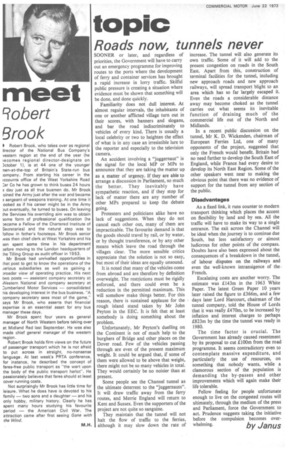topic
Page 50

If you've noticed an error in this article please click here to report it so we can fix it.
Roads now, tunnels never
SOONER or later, and regardless of priorities, the Government will have to carry out an emergency programme for improving routes to the ports where the development of ferry and container services has brought a rapid increase in lorry traffic. Skilful public pressure is creating a situation where evidence must be shown that something will be done, and done quickly.
Familiarity does not dull interest. At almost regular intervals, the inhabitants of one or another afflicted village turn out in their scores, with banners and slogans, and bar the road indiscriminately to vehicles of every kind. There is usually a local celebrity or two to heighten the effect of what is in any case an irresistible lure to the reporter and especially to the television camera.
An accident involving a "juggernaut" is the signal for the local MP or MPs to announce that they are taking the matter up as a matter of urgency. If they are able to arrange a discussion in Parliament, so much the better, They inevitably have sympathetic reaction, and if they stop for lack of matter there are any number of other MPs prepared to keep the debate going.
Protesters and politicians alike have no lack of suggestions. When they do not cancel each other out many of them are impracticable. The favourite demand is that the goods should travel by rail, or by water, or by thought transference, or by any other means which leave the road through the villages clear. The more sensible critics appreciate that the solution is not so easy, but most of their ideas are equally unsound.
It is noted that many of the vehicles come from abroad and are therefore by definition overweight. The restrictions must be rigidly enforced, and there could even be a reduction in the permitted maximum. This will somehow make things better. For this reason, there is sustained applause for the rough island stand taken by Mr John Peyton in the EEC. It is felt that at least somebody is doing something about the problem.
Unfortunately, Mr Peyton's duelling on the Continent is not of much help to the burghers of Bridge and other places on the Dover road. Few of the vehicles passing through are even of the present maximum weight. It could be argued that, if some of them were allowed to be above that weight, there might not be so many vehicles in total. They would certainly be no noisier than at present.
Some people see the Channel tunnel as the ultimate deterrent to the "juggernauts". It will draw traffic away from the ferry routes, and Merrie England will return to Kent and Sussex. Even the supporters of the project are not quite so sanguine.
They maintain that the tunnel will not halt the flow of traffic to the ferries, although it may slow down the rate of increase. The tunnel will also generate its own traffic. Some of it will add to the present congestion on roads in the South East. Apart from this, construction of terminal facilities for the tunnel, including new approach roads and new approach railways, will spread transport blight to an area which has so far largely escaped it. Even the roads a considerable distance away may become choked as the tunnel carries out what seems its inevitable function of draining much of the commercial life out of the North and Midlands.
In a recent public discussion on the tunnel, Mr K. D. Wickenden, chairman of European Ferries Ltd, one of many opponents of the project, suggested that only the French would benefit. Britain had no need further to develop the South East of England, while France had every desire to develop its North East Region. Some of the other speakers went near to making the obvious point that there was no evidence of support for the tunnel from any section of the public.
Disadvantages
As a fixed link, it runs counter to modern transport thinking which places the accent on flexibility by land and by sea. All the traffic will have to make its way to a single entrance. The exit across the Channel will be ideal when the journey is to continue due South, but less satisfactory or almost ludicrous for other points of the compass. Doubts have also been expressed about the consequences of a breakdown in the tunnel, of labour disputes on the railways and even the well-known intransigence of the French.
Escalating costs are another worry. The estimate was £143m in the 1963 White Paper. The latest Green Paper 10 years later raised the figure to £366m, and a few days later Lord Harcourt, chairman of the tunnel company, told the House of Lords that it was really £470m, to be increased by inflation and interest charges to perhaps £823m by the time the tunnel was ready in 1980.
The time factor is crucial. The Government has already caused resentment by its proposal to cut £100m from the road programme. It seems contradictory even to contemplate massive expenditure, and particularly the use of resources, on something that nobody wants, while a clamorous section of the population is demanding the by-passes and other improvements which will again make their life tolerable.
Fellow feeling for people unfortunate enough to live on the congested routes will ultimately, through the medium of the press and Parliament, force the Government to act. Prudence suggests taking the initiative before the compulsion becomes over
whelming. by Janus




















































































































